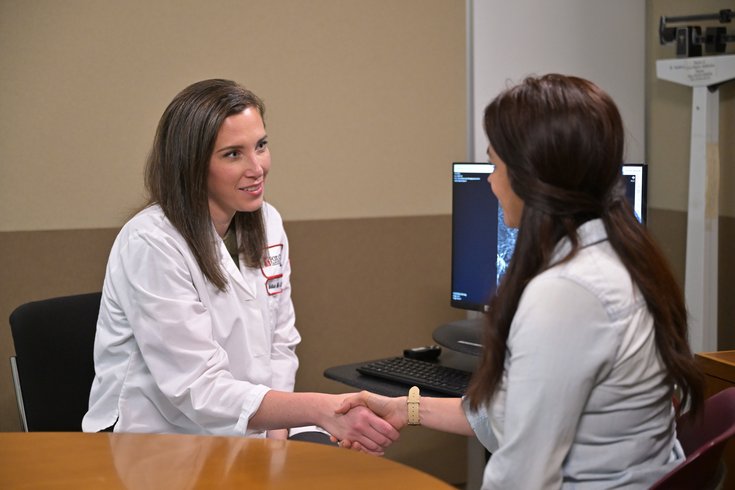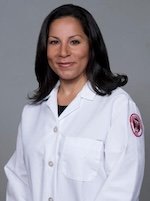
February 21, 2025
 Provided Courtesy/Fox Chase Cancer Center
Provided Courtesy/Fox Chase Cancer Center
Dr. Melissa McShane, a medical oncologist at Fox Chase Cancer Center, consulting with a patient.
When someone is diagnosed with breast cancer, their main concern is beating the disease. But at Fox Chase Cancer Center, doctors take a team-based approach to ensure that life-saving treatments don’t harm the heart in the process.
At Fox Chase Cancer Center, medical oncologist Dr. Melissa McShane specializes in treating breast cancer, while Dr. Eman Hamad, cardiologist and director of the cardio-oncology program at Temple University Hospital focuses on heart health. Together, they work to give patients the best chance of fighting cancer without putting their hearts at risk.

Melissa McShane, MD
This collaboration is particularly important because heart disease and cancer are the two leading causes of death in the United States. Research has shown that certain cancer treatments, lifestyle factors, and genetic predispositions can increase the risk of cardiovascular disease.
By integrating cardio-oncology principles, Dr. McShane and Dr. Hamad aim to reduce this risk while providing comprehensive cancer treatment.
Certain cancer treatments can weaken the heart, while radiation therapy may cause long-term heart damage.

Eman A. Hamad, MD
To minimize complications, Dr. McShane refers patients with pre-existing heart conditions (or those at high risk) to Dr. Hamad for preventive care before starting treatment.
But even patients without prior heart issues can develop them during treatment. That’s why Dr. McShane closely monitors her patients’ heart function. If any concerns arise, she immediately refers them to Dr. Hamad, who evaluates their heart health and provides treatment if needed. Dr. Hamad also tracks cholesterol and blood pressure levels to catch potential problems early.
“This is so important,” says Dr. McShane. “If Dr. Hamad can see patients early and put them on the right medications, we can continue their life-saving breast cancer treatments without interruption.”
Endocrine therapy (hormone therapy) is another treatment that, while effective against the recurrence of breast cancer, can increase the risk of high blood pressure and high cholesterol. Dr. McShane advises patients undergoing endocrine therapy to work closely with their primary care physicians to monitor their cardiovascular health.
“It’s really important because the majority of breast cancer patients do really well and we’re able to get them really good prognoses, and what we don’t want to do is work so hard for their breast cancer and then exacerbate all these other risk factors for cardiac disease.”
While medical interventions play a vital role in treatment, lifestyle factors significantly impact both heart disease and cancer risk.
According to Dr. Hamad, behaviors such as smoking, obesity, a sedentary lifestyle, poor diet, and excessive alcohol consumption all contribute to cardiovascular disease and cancer.
The American Heart Association’s Life’s Essential 8 provides a strong foundation for reducing these risks:
For people who have had breast cancer, following the Life’s Essential 8 guidelines can help reduce the risk of it recurring. Not smoking, exercising, and maintaining a healthy BMI “are very well-established, risk-modifying agents, and so I educate my patients on those,” Dr. McShane said.
Alcohol consumption is another factor that influences both cancer and heart disease risk. In January, the U.S. Surgeon General issued an advisory highlighting that alcohol consumption raises the risk of at least seven types of cancer, including breast cancer.
Regular screenings and early detection also play a crucial role in reducing cancer and heart disease mortality rates. The U.S. Preventive Services Task Force recommends women begin getting screened for breast cancer every other year starting at 40. But, Dr. McShane said, a person with a family member who developed breast cancer should start getting screened at an age 10 years younger than the age at which their family member’s breast cancer was diagnosed.
As the field of cardio-oncology continues to grow, more hospitals are adopting a team-based approach to heart health monitoring during cancer treatment. By working together, specialists like Dr. McShane and Dr. Hamad are helping patients not only survive cancer but also maintain strong, heart-healthy lives afterward.
With a holistic approach that integrates heart health into cancer treatment, patients at Fox Chase Cancer Center can move forward with confidence knowing that they’re receiving the best care possible for both their hearts and their recovery from cancer.
If you or a loved one are interested in learning more or wish to request an appointment with a Fox Chase specialist today, click here or call 888-FOX-CHASE.